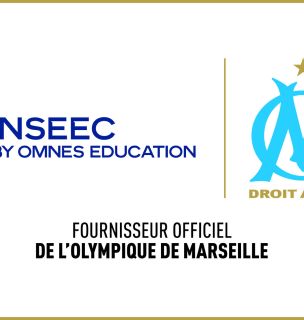The MSc Audit & Management Control course
The “Expert in Audit, Control & Consulting” certification aims to respond to the changing skills needs of the finance sector. The evolution of these skills results from changes in the activities and professions in the finance sector: stricter regulatory environment as well as an increase in the volume of data to be processed and analyzed, digitalization, use of technology, professional standards and competition.
Audits and management control are increasingly involved in steering and decision-making while controlling for associated risks.
They are increasingly participating in management and decision-making with control of the associated risks. Regulatory changes and the national and international economic situation lead, according to recent economic studies, to restructuring and seeking new sources of profits. In this context, financial institutions are looking for executives who are very aware of these news, able to constantly adapt.
To support this necessary new orientation, these markets remain very open to young, well-trained executives who are perfectly operational in their fields.
This program allows students to acquire training adapted to the expectations of organizations in terms of management control and internal audit.
The student must know how to make decisions based on an in-depth analysis of the financial statements of any organization and must master the appropriate tools for evaluating the operation and performance of a management service. Finally, he will be able to demonstrate editorial and interpersonal skills and technical skills which will allow him to implement financial studies, design dashboards or manage relations with shareholders.

A 1 or 2 year degree to become an expert in Audit and Management Control
Holders of a three-year bachelor’s degree can apply for the first year of the MSc, and holders of a four-year bachelor’s degree can apply directly for the second year.
The objectives
The objectives in terms of skills are to be able to:
- Manage and control company performance
- Carry out and lead the control and audit within the company or for a client
- Advise, inform on matters of taxation and business law
- Lead business teams as part of an audit and performance analysis mission
How to apply to the MSc in Audit & Management Control at INSEEC?
The required prerequisites
The conditions for accessing the certification system (excluding VAE) are:
- For entry into the 1st year of the course (MSc 1): to have validated 180 ECTS (level 6, License or equivalent) in the field of marketing, commerce, management or communication. He must have a professional level of English for the English-speaking program.
- For entry into the 2nd year of the course (MSc 2): to have validated 240 ECTS (level 6, Master 1 or equivalent) in the field of marketing. He must have a professional level of English for the English-speaking program.
- Executive training is subject to specific prerequisites with professional experience taken into account.
Would you like to know more about the MSc in Audit & Management Control?
Sign up for an Open House!
Would you like to know more about the admission conditions for our programme in MSc in Audit & Management Control?
Courses
The courses presented below are given as an example, they may vary slightly depending on the teaching campus. The course content is adapted each year to market developments and updated before the start of each new school year.
1st year courses
PROFESSIONAL METHODS AND PRACTICES – 1ST YEAR
BUSINESS ENGLISH
This business English module applied to marketing allows learners to implement and apply the right vocabulary and attitude..
SOFTWARE & DECISION SUPPORT TOOLS
This module aims to deepen the skills of students in IT to meet the demands of companies in terms of budgetary or commercial monitoring, project management, personnel management and communication: Excel, Word, PowerPoint, communication tools. teamwork, business software. It aims to perform well on office tools, quickly identify and correct errors, personalize existing tools or create your own tools.
BUDGET MANAGEMENT AND DASHBOARD REPORTING
The focus will be on structuring budgets, making use of summary documents, project controls as they relate to budget management and the creation and steering of performance indicators.
PROFESSIONAL TOOLS & METHODS
This module allows learners to improve their CV and their posture, notably through role-playing (business game, professional simulation, speaking, etc.); practical and professional workshops (CV, professional social networks, coaching, etc.) as well as professional conferences and master classes.
BUSINESS PLAN AND COMPANY CREATION
The aim of this module is to learn how to produce a Business Plan: design of a costed project for the creation or development of a business. Several stages are addressed: feasibility study, market targeting, opportunities and risks, strengths and weaknesses, communications, financing plan and profitability.
TECHAWAY PROGRAMMING : PYTHON
Apply variables in Python programming to store, modify and retrieve data. Evaluate loop implementations for performance and readability, and create complex loop structures to solve advanced programming problems. Apply Pandas for data manipulation and analysis tasks.
TRANSVERSAL AND FUNDAMENTAL COURSES
IN-DEPTH FINANCIAL ANALYSIS
Mastery of fundamental concepts for establishing financial forecasts. Sources of information, sectoral analysis, analysis of economic and financial performance, analysis of the financial structure and financing method.
AUDIT AND ACCOUNTING
The seminar covers account audit missions as well as audit procedures, tests, methods and tools. Presentation of the legal audit, general aspects and implementation of the audit, assessment of internal control, specific verifications and end-of-mission reports. Analytical procedures, physical controls and management reporting are also covered.
INTERNAL AUDIT
Evaluation of operations and the level of control of the company. Provision of advice and study of tools to contribute to the creation of added value. Evolution of the auditor profession.
FUNDAMENTALS OF FINANCIAL ANALYSIS
Modern financial diagnostic tools to carry out a global analysis of the company. Tools to help with financial diagnosis: the study of the profitability, solvency and financial structure of the company. Study of profitability.
IN-DEPTH COMPTABILITY
Mastery of the accounting procedure; consolidation of accounts; allocation of income ; capital reduction; valuation of securities; formation of companies; increase in capital ; convergence of PCG towards IFRS standards.
MANAGEMENT CONTROL
Calculation of the break-even point and calculation of the break-even point. Budget management techniques, activity management and dashboards. Analysis and use of management control, cost calculation methods, analysis center methods, rational allocation of fixed costs, marginal cost, partial costs.
BUSINESS LAW
Definition of business law. The concept of contract. The different types of obligation: obligation of means and obligation of result. The concept of legal personality, the functioning of private and public limited companies and general partnerships (SARL, SA, SNC). The criteria for choosing a business structure. The role and powers of control and management bodies.
INTERNATIONAL FINANCIAL STATEMENTS
The objective of this course is to understand different types of management in order to run one’s team more efficiently. Management should be able to consider business objectives while guaranteeing team motivation and cohesion. The course also addresses how to identify conflict risks within the team by accounting for collaborators’ personalities and expectations. This course integrates various positive management scenarios and emphasizes the notion of leadership over that of management.
BUSINESS FINANCE
Investment projects: selection criteria as well as the real options approach. Financing methods: quasi-equity, bond financing, negotiable debt securities, IPO, risk capital. Explanatory theories of financing choice. Treasury and centralized flow management.
BUSINESS TAXATION
Les principes et les champs d’application de l’IS, l’optimisation fiscale dans un groupe. La fiscalité internationale. La TVA : principes et mécanismes. Les régimes particuliers de la TVA. La territorialité de la TVA : les règles de la territorialité de la TVA, les livraisons de biens meubles, la prestation de service. La TVA exigible : l’assiette de la TVA et son calcul.
E AMF
This module delivered in a hybrid manner will allow you to understand the role of the Financial Markets Authority in the regulation and supervision of financial markets, through the following subjects: financial instruments, cryptoassets and risks, collective management, functioning of the organization of markets, post-market and market infrastructures, issues and securities transactions and finally the accounting and financial bases.
FINANCIAL MATHEMATICS
Understand and master the principles of discounting and capitalization. Interest calculation. Comparison of financial flows over time. Calculation of the main profitability indicators in an investment project.
EXAMS
EXAMS
Written exams and professional report defense
2nd year courses
PERFORMANCE AND CONTROL- 2ND YEAR
FINANCIAL STATEMENTS AND DIAGNOSIS
Diagnosis of a company’s value creation process: analysis of economic and financial performance; analysis of operational and financial risks. Case studies.
BANK MANAGEMENT CONTROL
Mastery of the specificities of banking management control through the accounting structures specific to this activity. Impact of regulations linked to financial security (LSF, BASEL I, II and III, SOX and Solvency I and II, etc.).
MANAGEMENT CONTROL AND COST CALCULATION
Study of different cost calculation methodologies: full cost method, partial cost method, rational allocation, ABC method, UVA method. Budget management, construction of social dashboards: workforce management, social audit, recruitment, training, remuneration.
IN-DEPTH COMPTABILITY
The objectives of accounting and tax information. The basic principles, concepts and mechanisms. Accounting regulations in France. Main accounting and tax documents. Capital operations: capital increases; reduction of share capital; repurchases of own shares. Consolidated accounts. Results management in an SA.
SOCIAL MANAGEMENT CONTROL
Learn to measure the performance of human capital in the company. Balance between payroll costs, staff efficiency and talent management system.
PERFORMANCE MANAGEMENT
Appreciate financial and extra-financial indicators to understand the overall functioning of the organization. Identify the transversality of the company’s performance objectives and its management inadequacies. Master the plurality of financial performance objectives to establish an appropriate strategy.
OPTIMISATION AND FINANCIAL RECOMMENDATION
CREDIT MANAGEMENT
Customer relationship management (CRM). Control of payment deadlines. Optimization of upstream cash flows. Optimize the use of payment and financing instruments. BFR control.
GROUP AUDIT
Purpose of internal audit applied to a group; study of tools specific to internal audit; case of auditing subsidiaries as part of a group strategy.
INTERNAL CONTROL AND RISK MANAGEMENT
Concepts et fondamentaux du contrôle interne et du management des risques de l’entreprise. Environnement réglementaire lié au contrôle interne. La notion de risque en entreprise.
IT AUDIT AND DATA SECURITY
Raise students’ awareness of the real risks of attack on systems within a company and the realities and consequences of industrial espionage. Study of tools to combat these potential threats and implementation of a strategy for identifying vulnerabilities in an organization.
ACCOUNTING, TAX AND FINANCIAL AUDIT
Study of tools specific to tax, accounting and financial audits; tax procedures and disputes; audit of the accounting of long-term debts and financial assets; audit of the accounting of intangible assets and inventory valuation.
TAXATION AND REPORTING
IN-DEPTH TAXATION
Study of the principles of corporate taxation (VAT, corporate tax, litigation procedures); impact of taxation in management decisions. Understand the taxation of a company’s results by understanding the areas of BIC, BNC and BA.
CERTIFICATION AND AUDITORS
General principles of account certification, internal control and review of accounts, audit trails and circularization techniques, specificities of accounting review rules under IFRS standards: validation of business plans; validation of the revision of business plans; validation of the segmentation of the reporting segment; validation of the content of deferred taxes; validation of transfer pricing; validation of the structure of financial statements; verification of the analytical routing of accounting entries
IN-DEPTH TAXATION
Study of the principles of corporate taxation (VAT, corporate tax, litigation procedures); impact of taxation in management decisions. Understand the taxation of a company’s results by understanding the areas of BIC, BNC and BA.
FINANCIAL AND STRATEGIC REPORTING
Mastery of reporting tools based on concrete cases. Use of reporting as an activity management tool. Implementation and mastery of management tools performance driven by management control (balanced scorecards, executive scorecards, dashboards and strategic planning). Deferred taxes, inventory, cost of production of sales, expenses R&D, goodwill impairment, tangible assets, employees and benefits plan accounting, retirement benefits plan accounting, leasing, long-term financial debts.
TAKEAWAY DATA VISUALIZATION AND DATA ANALYSIS – POWER BI
Understand the basic concepts of Business Intelligence and Power BI, including its interface, main features and visualization. Create comprehensive Power BI reports and dashboards, tailored to specific business needs and incorporating best practices in data visualization and business intelligence.
INTERNATIONAL ACCOUNTING STANDARDS (IFRS)
Deepen knowledge of the practice of IFRS standards; understand the reference system and the normative framework applied at the international level. Better understand the techniques and procedures recommended by accounting and financial standards; prepare and analyze summary financial statements.
RESEARCH AND APPLICATIONS
APPLIED RESEARCH DISSERTATION
Allow learners to know the expectations of the applied research dissertation. Formulate a problem, construct a literature review, choose the study methodology, make recommendations. Construct an applied research dissertation including a literature review, a qualitative and/or quantitative study, and recommendations.
PROFESSIONAL TOOLS AND METHODS
This module allows learners to improve their CV and their posture, notably through role-playing (business game, professional simulation, speaking, etc.); practical and professional workshops (CV, professional social networks, coaching, etc.) as well as professional conferences and master classes.
COMPUTERISED MANAGEMENT TOOLS
Organise data from multiple sources, in different formats in order to build clear dashboards. Automate data collection to reduce decision-making time and minimize errors due to re-entry. Present data and improve visual communication of information.
GOVERNANCE AND CSR
Understand the company’s strategic approach to prepare for its long-term development. Carry out a global diagnosis by integrating the ESG theme (environment, social, governance) and its analysis frameworks. Knowledge of the managerial structure of companies (management and control) and manager/partner relationships. Diagnosis of listed companies in terms of CSR.
EXAMS AND SUPPORT
EXAMS AND SUPPORT
Written exams / Research dissertation dissertation.
2 start dates per year and varying study formats
There are two openings per year, in February/March and September/October. To check the enrolment availability, contact the admissions department directly.
The pace of the courses may differ depending on the campus and whether the training is carried out under an internship agreement (full-time study) or a professionalization/apprenticeship contract (continuing education).
The work-study contract must be signed for a period of 12 months (MSc2), 24 months (MSc1 + MSc2) or 18 months for the staggered start in March (continuing studies in MSc2).

Career opportunities after an MSc Audit & Management Control
- Management Controller
- Financial Auditor / Auditor
- Accounting Consultant / Finance Consultant / Management Consultant
- Accounting Manager
- Banking & Tax Lawyer / Financial Markets Lawyer
What are the blocks of professional skills developed?
Professional certification allows you to prepare the following skill blocks:
- Manage and control company performance
- Carry out and lead the control and audit within the company or for a client
- Advise, inform on matters of taxation and business rights
- Lead business teams as part of an audit and performance analysis mission
Description of the methods for acquiring certification by capitalization of skill blocks and/or by correspondence
Certification is obtained by:
- Validation of four skill blocks common to all courses (obtaining a score greater than or equal to 10/20 for each skill block)
- Completion of an end-of-studies dissertation with a grade greater than or equal to 10/20
- Completing a period in a company of at least 132 days in the second year of the course (MSc 2)
“The Expert in Audit, Control & Consulting ” > certification is a level 7 title (EU) diploma, NSF codes 313 and 314, awarded by INSEEC (INSEEC EXECUTIVE EDUCATION, CEE-RA, CEE-SO, CEFAS, MBA INSTITUTE, CEE-OUEST, CEE-M), registered under number 35008 in the French National Directory of Professional Certifications (RNCP) by decision of France Compétences on October 14, 2020.
The certification is awarded by completing all skills blocks in their entirety. Every skill in a block must be acquired in order to earn the block; partially complete blocks do not count. It is also possible to obtain the certification through Validation of Acquired Experience (VAE).
Find the skills blocks for this RNCP title by clicking here.
What are the teaching methods?
Teaching methods
- Lectures and interactive courses
- Situational exercises through collective or individual case studies carried out by the students
- Conferences, seminars and educational visits
Evaluation methods
- Individual or group case studies
- Individual and group oral presentations
- Individual and group files
Methods and tools
- The evaluation methods are in person, in the form of continuous assessment or final written exams.
What is the 2024/2025 tuition to enter the programme?
SPRING INTAKE – 2025
Full-time studies:
- MSc1 : €11,400
- MSc2 : €12,950
Continuing education (sandwich course) :
- 24 months : €22,850 before tax
- MSc2 : €13,650 before tax
FALL INTAKE – 2025
Initial training:
- MSc1 : 11 850 €
- MSc2 : 13 500 €
Continuing education (sandwich course) :
- 24 months : 23 850 € HT
- MSc2 : 24 250 € HT
International Student Pack: Mandatory fee of €490 for exclusive support services for international students.
What kind of financial aid is available?
INSEEC offers several financial aid schemes:
- The alternating rhythm, in internship or work-study contract
- The right to training via the CPF
- Banking partnerships
Key figures for the MSc Audit and Management Control PROGRAMME
85%
Overall satisfaction with training after 6 months – Class of 2022
94%
National success rate – Class of 2023
86%
Employability rate (196 anwsers under 472) – Class of 2022
97%
Presentation rate – Class of 2022
Disability
The OMNES Education Group pays particular attention to the societal environment, including the disability dimension. Indeed, we believe that students with disabilities should not have any problems in pursuing their studies and starting a professional career. We accompany them to facilitate their access to the premises, offer them personalized advice as well as adapted accommodations throughout their school career.
Accessibility of premises: all our campuses are accessible to people with disabilities.
To learn more about INSEEC’s disability policy, click here.
Contacts for disability referents by campus:
Bordeaux : Maxime DOUENS – mdouens@inseec.com
Lyon : Anissa GASMI – agasmi@inseec.com
Rennes : Laura LE CALVEZ – llecalvez@omneseducation.com
Paris : Farid HAMAD – fhamad@inseec.com
Chambéry : Clément BERTACCO – cbertacco@inseec.com
Marseille : Océane VALOTTI – ovalotti@omneseducation.com
News

June 2024
INSEEC hosted the CFNews Grands Prix de la Croissance Externe Sud Ouest for the second year running
Read more





